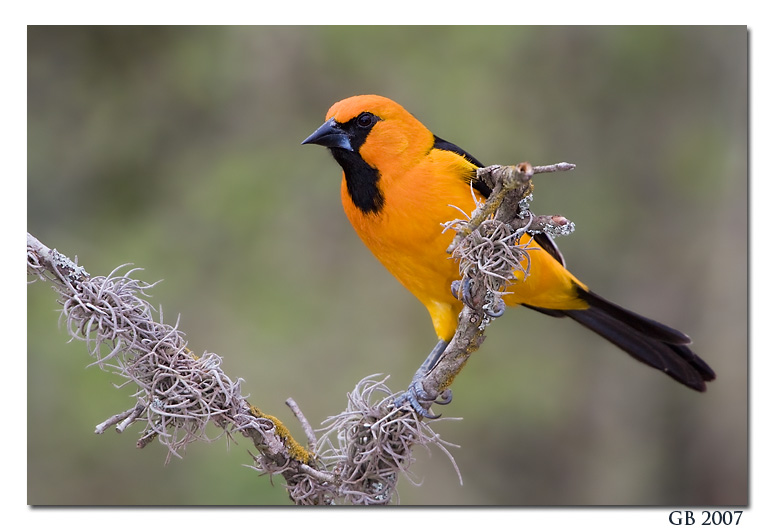
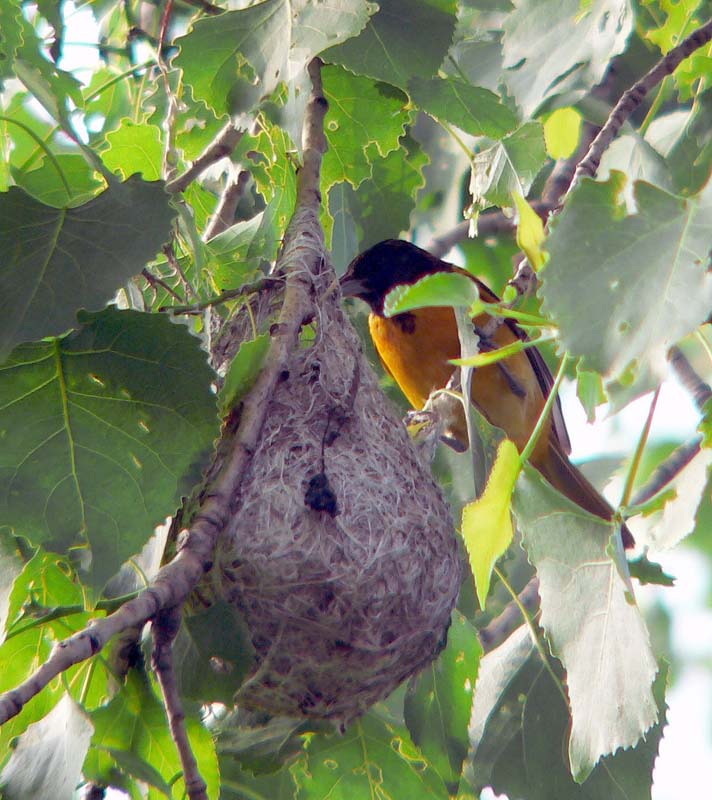
Oriole
IN Birmingham, New York, last summer, a pair of orioles built their hanging nest in
a tree opposite a tinsmith's. The limb to which the nest was suspended recently blew
down, and the nest is now preserved as an evidence of the remarkable skill and instinct of these birds, for the nest was found securely wired to the branch with pieces of
wire which had been picked out of the sweepings of the shop.
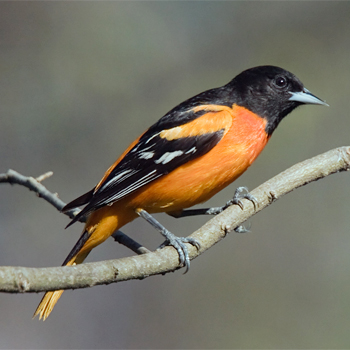
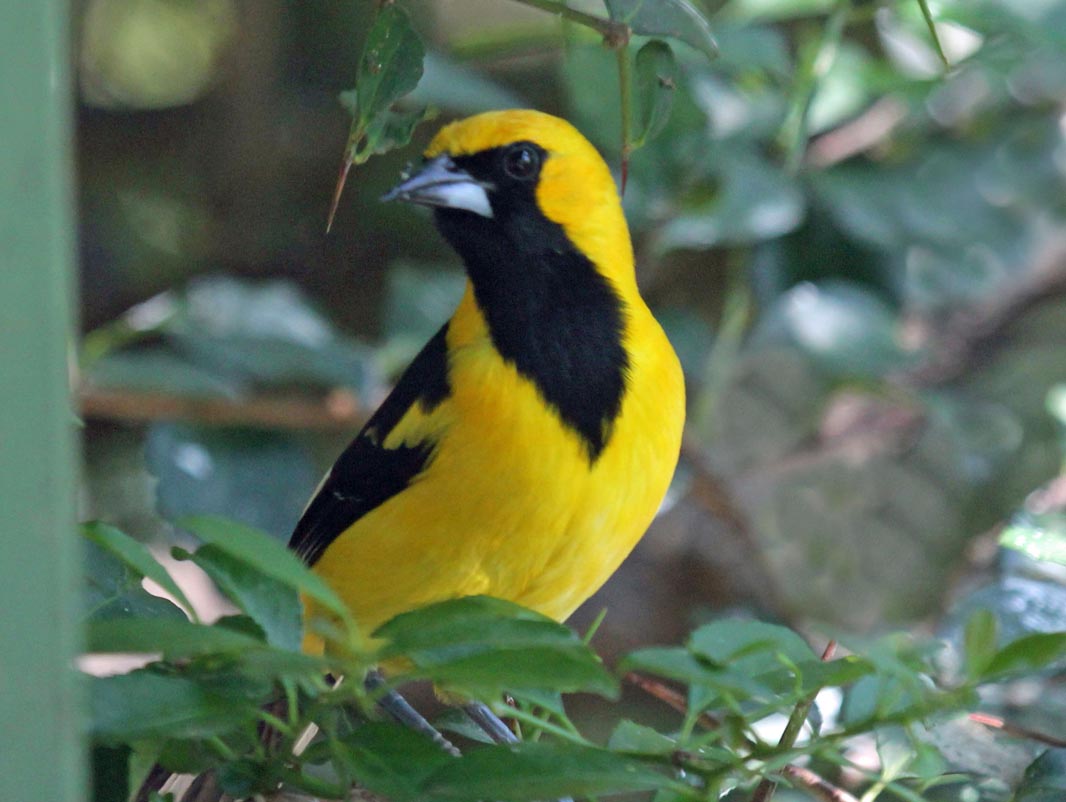
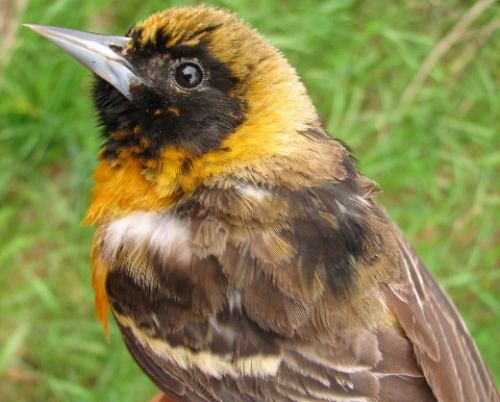
THE ORIOLE'S MESSAGE.
FIDELIA! Fidelia!"
Miss French did not understand little girls very well, and found it hard to be patient sometimes, when Fidelia was thoughtless and forgetful.
So the voice had a harsh sound as it rang out through the sweet June air, reaching Fidelia's ears while she bent over the rockery in the corner of the orchard.
"She might just let me see if my mountain violets are blossomed out yet, and not be so cross all the time," thought Fidelia.
Then looking down the lane where the graceful barberry-bushes hung their clusters over the stone wall, she thought,—
"I'm 'most a-mind to run down there, and not let her know I heard.
I believe 't would serve her right."
The next minute her feet were flying down the lane,—on, on, by the locust corner, through the gap in the wall, into the pine grove.
The air was soft and cool here, but she did not lie down to rest upon the piny carpet as she had so often done.
She passed through the grove to a breezy spot just beyond, where, under a waving willow, were a few gravestones.
Among them was a new one of pure white marble, for it was not very long since Fiddie's mother had died.
She threw herself upon the grass, close by the roses which bloomed above the graves, and burst into a flood of tears.
"O mamma, mamma!" she cried.
"I want you back.
I can't be good and happy without you.
Oh, dear! dear!
Won't she ever come again?
I can't bear it."
And she buried her face in her hands, and sobbed as if her heart would break.
She was far away from the sound of Miss French's voice, and there was no one near; but all at once she stopped crying to listen.
Yes, there it was again,--
"Fiddie! Fiddie! Fiddie!
Be true!
Be true!"
She looked into the tree from which the sound came, and there, hopping up and down, and in and out, was a beautiful oriole.
"Fiddie! Fiddie! Fiddie!
Be true I Be true!" he whistled again, while his black and golden feathers gleamed in the June sunlight.
A grieved and sorry look came over the little girl's features.
She was thinking of one day in April, when .her dear mamma's white face lay upon the pillow, and the thin hand smoothed her hair.
"Fidelia," she whispered, "your name means 'faithful’”:
I named you so because God had been so faithful to me, and I wished to be faithful to him.
And now, my last words to you are, little daughter, be faithful and true to papa, and to your heavenly Father too.
Take it for your motto, dear.
Be faithful—be true."
Poor mamma!
She was tired then; and the next morning, when Fidelia went to her mother's room, she found that the dear Saviour had given her a rest from which she would never wake to be sick again.
" I wonder if it was God that made the golden robin sing that to me?"
thought Fiddie, as over and over again the same whistling sounds rang out clear and sweet.
" I will be true!" she answered, half aloud.
"Mamma said, ' Be faithful—be true; ' and I wasn't faithful in doing my chores this morning.
Besides, I wasn't true.
I cheated Miss French, and ran away, instead of going back to the house, when she called me.
There, I should think she'd be cross at me.
And papa'd be sorry too, I know." Fidelia lay for a little while upon the grass, looking up into the blue sky, with its soft, fleecy little clouds, repeating again and again to herself her mother's words.
It seemed so long since she had felt the kindly touch of her mother's hand, and a great lump rose in her throat as she thought how her mother would have grieved to see her lit, tie girl behave so naughtily.
Was it not the best thing she could do to go back and confess her fault
to Miss French?
She was truly sorry now, and she knelt upon the grass under the willow, and asked the dear Saviour to help her not to forget again.
Then she walked quickly back through the lane. Miss French looked very sternly at her at first.
But Fidelia told her all about it,—the running away, the message that God gave the birdie for her, and how very sorry she was.
"I will try to be faithful and please you all the time, Miss French," she said; " and I don't believe I shall ever forget the birdie's words either."
Miss French had a very kind heart; and putting her arm about the child's neck, she kissed her warmly, and said,—
" I'll try to help you all I can, dear."
Is it any wonder that the golden robin was Fidelia's favorite among the summer songsters after that?
She never heard his liquid whistle without feeling that her heavenly Father himself was speaking, to remind her of her mother's motto,
"Little daughter, be faithful—be true; " for the birdie's song was always the same,—
"Fiddie, Fiddie, Fiddie!
Be true! Be true!"
Lillian Payson.
orioles
THE ORIOLES' INGENUITY.
ON the western side of Central Park, near the upper end, stands a row of elm-trees, difficult to approach on account of a heavy growth of syringe bushes around them. On a branch of one of the trees, about •sixteen feet from the ground, a pair of Baltimore orioles set to building a nest. They chose the extreme end of the bough, with evident intention of making it a hazardous experiment for any bird-nester to attempt to molest them. But in their excess of caution they appeared not to observe what the few persons whose eyes were keen enough to see the first labors of the little architects saw,-that the branch was much too slender to support so large a nest as an oriole builds.
When the nest was about two-thirds finished, the birds saw their mistake. The branch had bent so low that it was getting perilously near the grass. Work was at once stopped, and the builders sat close together for a long time, and seemed to be discussing the situation. Finally they flew side by side to a bough about fifteen inches over the one on which their nest was, and, leaning over ,inspected the distance. They seemed to be satisfied, and, though it was growing rapidly dusk, the birds flew away in opposite directions. In the morning it was found that they had firmly secured their habitation, and prevented the branch from bending lower by passing a piece of white string, which they had found somewhere in the park, overt1kp upper bough, and fastening both ends of it securely to the edges of the nest. The building then went rapidly on, and the orioles hatched their eggs, and have gone to warmer regions long ago.
There are two things I want to say as to the teachings of this story. One is, that no one man, woman, or child-ought willfully and want only to injure or harm these little creatures. Be kind to all living things, unless they are harmful.
And the other thing is, that we ought to reverence the great wisdom of God, who can put such instinct into even the little birds that fly and sing in our trees. The book of nature, as well as the Bible, tells us that God is wise and good. The little bird cannot recognize the One who teaches him to build his nest and to sing. But we know how good God is to us, and we ought to love and serve him.
The Child's Paper.